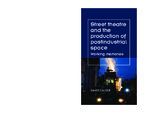Street theatre and the production of postindustrial space
Working memories
| dc.contributor.author | Calder, David | |
| dc.date.accessioned | 2019-12-03 08:32:13 | |
| dc.date.accessioned | 2020-04-01T10:14:22Z | |
| dc.date.available | 2020-04-01T10:14:22Z | |
| dc.date.issued | 2019 | |
| dc.identifier | 1005176 | |
| dc.identifier | OCN: 1126206415 | en_US |
| dc.identifier.uri | http://library.oapen.org/handle/20.500.12657/24930 | |
| dc.description.abstract | Street theatre and the production of postindustrial space explores how street theatre transforms industrial space into postindustrial space. Deindustrializing communities have increasingly turned to cultural projects to commemorate industrial heritage while simultaneously generating surplus value and jobs in a changing economy. Through analysis of French street theatre companies working out of converted industrial sites, this book reveals how theatre and performance more generally participate in and make historical sense of ongoing urban and economic change. The book argues, firstly, that deindustrialization and redevelopment rely on the spatial and temporal logics of theatre and performance. Redevelopment requires theatrical events and performative acts that revise, resituate, and re-embody particular pasts. The book proposes working memory as a central metaphor for these processes. The book argues, secondly, that in contemporary France street theatre has emerged as working memory's privileged artistic form. If the transition from industrial to postindustrial space relies on theatrical logics, those logics will manifest differently depending on geographic context. The book links the proliferation of street theatre in France since the 1970s to the crisis in Fordist-Taylorist modernity. How have street theatre companies converted spaces of manufacturing into spaces of theatrical production? How do these companies (with municipal governments and developers) connect their work to the work that occurred in these spaces in the past? How do those connections manifest in theatrical events, and how do such events give shape and meaning to redevelopment? Street theatre’s function is both economic and historiographic. It makes the past intelligible as past and useful to the present. | |
| dc.language | English | |
| dc.subject.classification | thema EDItEUR::A The Arts::AT Performing arts::ATD Theatre studies | en_US |
| dc.subject.classification | thema EDItEUR::A The Arts::AT Performing arts::ATD Theatre studies::ATDF Theatre direction and production | en_US |
| dc.subject.classification | thema EDItEUR::A The Arts::AT Performing arts::ATX Other performing arts | en_US |
| dc.subject.other | street theatre | |
| dc.subject.other | postindustrial space | |
| dc.subject.other | deindustrialization | |
| dc.subject.other | redevelopment | |
| dc.subject.other | working memory | |
| dc.subject.other | theatricality | |
| dc.subject.other | performativity | |
| dc.subject.other | theatre historiography | |
| dc.title | Street theatre and the production of postindustrial space | |
| dc.title.alternative | Working memories | |
| dc.type | book | |
| oapen.identifier.doi | 10.7765/9781526147288 | |
| oapen.relation.isPublishedBy | 6110b9b4-ba84-42ad-a0d8-f8d877957cdd | |
| oapen.relation.isFundedBy | a897f645-c917-4be8-a0db-e8b3f64cac47 | |
| oapen.relation.isbn | 9781526147288 | |
| oapen.pages | 216 | |
| oapen.place.publication | Manchester, UK | |
| oapen.identifier.ocn | 1126206415 |

